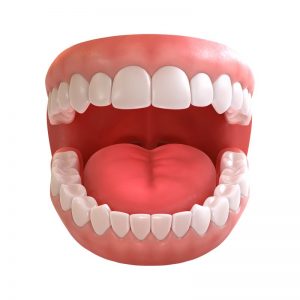Why Does Understanding the Parts of the Mouth Promote Oral Care?
November 4, 2021

As a child, when you are taught about proper oral care, the vast majority of the lesson likely focused on teeth. Perhaps it was entirely about teeth.
While it makes sense that they would be prioritized, there is a lot more going on when it comes to oral hygiene. When your dentist in Freedom explains the parts of the mouth, it promotes oral care because you understand that teeth are only a part of the equation.
Keep reading to learn about other components of your mouth that each plays their role to help you function normally.
Your Tongue, Lips, and Cheeks Help the Teeth
The tongue is a powerful muscle that facilitates chewing, swallowing, speaking, and tasting food. Taste buds, sensory receptors on your tongue, enable you to enjoy the food you eat. In fact, the human tongue can have up to 10,000 taste buds, which help you detect sweet, salty, bitter, and savory flavors.
The pressure that the tongue applies within the mouth helps the oral cavity maintain its shape and keeps the teeth in their proper position.
Your lips and cheeks contribute to everything from forming your facial expressions to breathing to speaking. They also keep food and saliva in your mouth while you chew. These strong muscles brace your teeth to keep them in the proper position.
What Purpose Do Your Temporomandibular Joints Serve?
Your two temporomandibular joints facilitate your ability to chew, speak, and swallow. They also enable your mouth to open and close, as well as allow you to move your lower jaw forward and side to side.
These joints are located on both sides of your head near your ears and work together with your jawbone, facial muscles, and ligaments. Any disruption to the synchronization of this pair, which can happen if you grind your teeth at night, can result in facial pain, difficulty in chewing, and jaw stiffness.
How Do Your Salivary Glands, Gums, and Alveolar Bone Assist the Teeth?
You have six salivary glands that produce the clear liquid known as saliva, which is made up predominantly of water and contains substances that break down food to begin the digestive process. Saliva also moistens your mouth to help with speaking, chewing, and swallowing.
Plus, it washes bacteria from your teeth and gums. The proteins and minerals in saliva play a vital role in protecting the enamel, as well.
Your mouth’s gum tissue holds your teeth in place and protects the roots from decay. You may be familiar with gum disease, and the main symptoms include swelling and chronic bleeding. These warning signs are important because unchecked gum disease can lead to tooth and bone loss.
On the other hand, the alveolar bone is not a well-known portion of the mouth. The roots of your teeth anchor them in your jawbone. The alveolar bone surrounds the roots to stabilize the teeth.
If you take diligent care of your teeth, that’s a huge win for your oral and overall health. But there is plenty more going on in your mouth that could use some attention. Add flossing, brushing your tongue, rinsing with an antimicrobial mouthwash, and regular visits to your dentist to your to-do list. Having a thorough oral hygiene regimen could very well save you a lot of stress, pain, and money in the long term.
About the Practice
At Dental Expressions, our husband-and-wife team of Drs. Robert and Heather Heil believe that your entire family deserves the opportunity to have healthy, confident smiles. Our team utilizes the latest dental technology to perform a wide range of services and we are always happy to see you. Our office is in-network for many major plans and we’re happy to file claims on your behalf. If you need a dental cleaning and exam as part of your efforts to care for your entire mouth, we are ready to help as your dentist in Freedom. Just visit our website or call (920) 788-6280.
No Comments
No comments yet.
RSS feed for comments on this post.
Sorry, the comment form is closed at this time.






